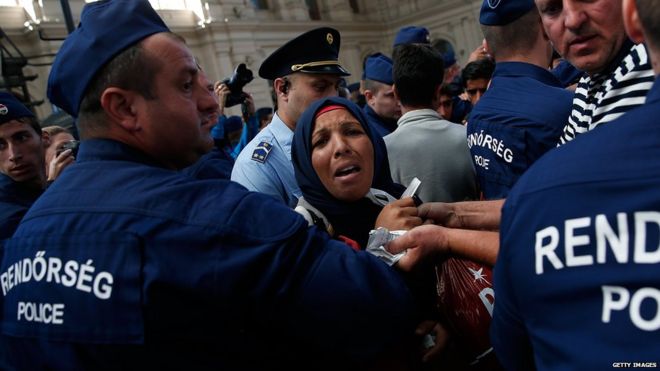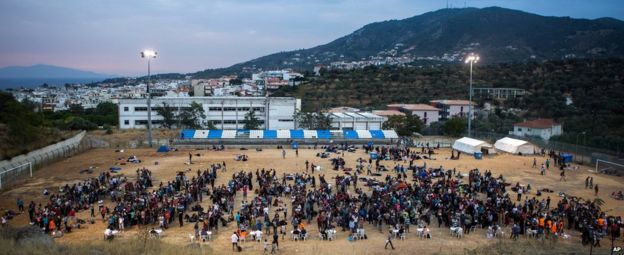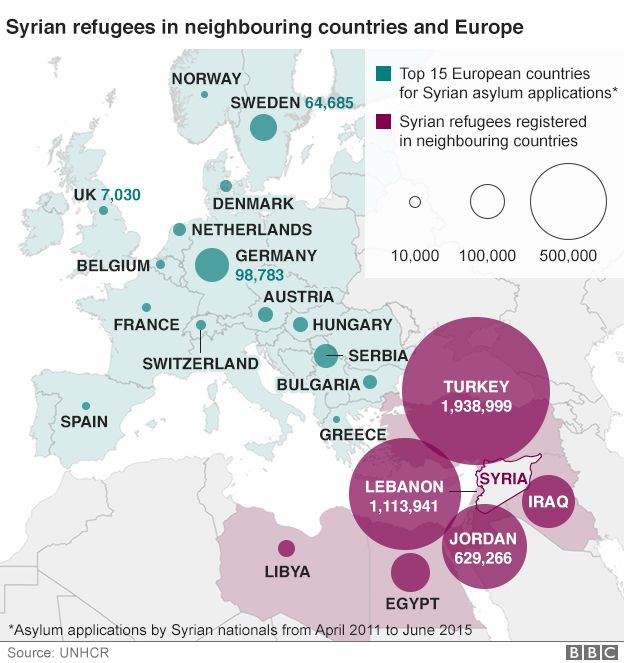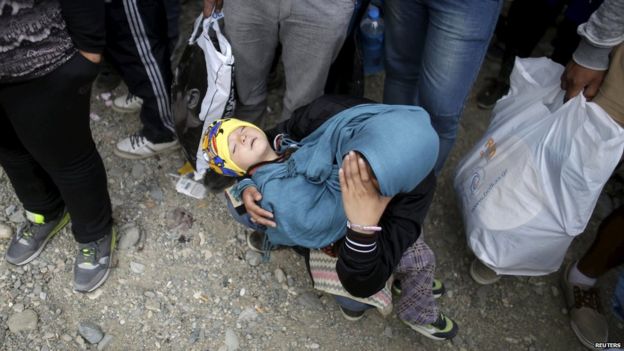Migrant crisis: Germany 'can take 500,000 asylum seekers a year'
- 44 minutes ago
- Europe
 Getty Images
Getty Images
Germany can cope with at least 500,000 asylum seekers a year for several years, Vice Chancellor Sigmar Gabriel has said.
Germany expects more than 800,000 asylum-seekers in 2015 alone - four times the 2014 figure.
Mr Gabriel reiterated that other EU states should share the burden.
The UN's refugee agency, UNHCR, says a record 7,000 Syrian migrants arrived in Macedonia alone on Monday and 30,000 were on Greek islands.
The migrant influx has unsettled European governments and prompted diverse responses. Hungary's conservative leadership is building a border fence to try to keep them out, but German politicians have expressed pride in crowds who turned out to welcome new arrivals.
A Greek minister said on Monday that the island of Lesbos, which sits off the Turkish coast, was "on the verge of an explosion" due to a build-up of 20,000 migrants.
The government and UNHCR have brought in extra staff and ships to process them.
Germany expects some 800,000 migrants this year, but Mr Gabriel said it was prepared for more in the longer term.
"I believe we could certainly deal with something in the order of a half a million for several years," he said in an interview with Germany's public ZDF television.
"I have no doubt about it - maybe even more."
But he also urged other members of the EU to play their part.
 AP
APAt the scene on Lesbos: Jonny Dymond, BBC News
It is blazing hot at the Georgios Scufos Training Centre in Mytiline; a queue of hundreds stretches down the hill as Syrian refugees wait for entry, covering their heads with clothing, bags, pieces of cardboard, anything to keep the boiling sun off their heads.
Along one side of the former football pitch, plastic tables are staffed by Greek government officials, assisted by volunteer translators. The refugees present their papers and passports - many have wrapped their passports so tightly in plastic that they struggle to get them open.
But once they prove their identity the processing is quick. With government papers in their hands the refugees have what they so long for - the authorisation to buy tickets for the specially chartered boats that will take them to Athens.
Nothing is easy for the refugees in Lesbos - but this hot little patch of land is the first piece of good news they have had for a long time.
The UNHCR highlighted the growing scale of the migrant issue, releasing new figures that suggest it expects 400,000 migrants to arrive in Europe by sea in 2015.
The majority are Syrian, and the UN says many are now seeking a better life in Europe because of poor conditions in refugee camps in Jordan and Lebanon - caused in part because of a drastic shortfall in multilateral aid programmes.

European Commission chief Jean-Claude Juncker is expected to unveil proposals on Wednesday to distribute 160,000 refugees among member states on a mandatory basis - a programme, the UN says, which is now the only solution.
"History will judge this as a defining moment for Europe," said the UN special representative on migration Peter Sutherland.
The crisis has divided the 28-nation bloc.
Hungary, along with the Czech Republic, Slovakia and Romania, has rejected the idea of quotas - saying they would be futile if the EU's outer borders cannot be defended.
The issue is a political hot potato in Hungary, with Defence Minister Csaba Hende stepping down on Monday in a surprise move thought to be connected with the construction of a border fence. It has so far proved ineffective.
 Reuters
Reuters Reuters
Reuters
Migrants there have also faced down authorities who have had to abandon attempts to prevent them moving north.
Meanwhile on Lesbos, a processing centre has been set up on an abandoned football ground to try to clear a backlog of stranded migrants.
Lesbos, just off non-EU Turkey, is a point of entry to EU member Greece.
But correspondents described utterly squalid conditions there, with makeshift camps springing up and migrants sheltering in doorways, alleyways, streets and squares in the main town of Mytiline.
On Monday, officials said that the processing centre on Lesbos would operate around the clock for five days to try to clear the backlog of migrants needing papers to move on.
On Monday night, about a dozen coastguards and riot police armed with batons struggled to control some 2,500 migrants surging towards one of three ships chartered to ferry people to Athens, reported AFP news agency.

No comments:
Post a Comment